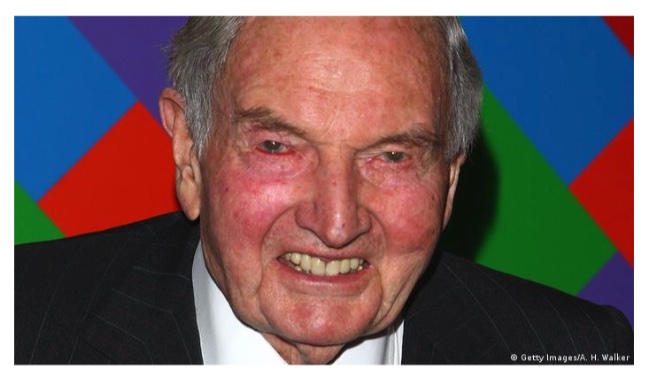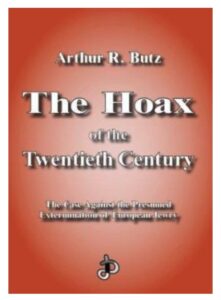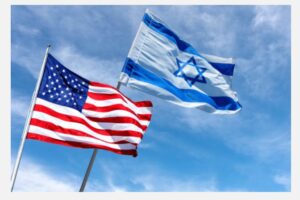William de Berg
“The supranational sovereignty of an intellectual elite and world bankers is surely preferable to the national auto-determination practiced in past centuries.” – David Rockefeller, Memoirs, 2003, p. 405.
It was September 1991, the moment of President George H Bush’s address to the United Nations proclaiming a “New World Order”.[1] The Western globalist elites were basking in the belief they had finally achieved their dream of conquering the world. The Soviet Union, the postwar archenemy of the U.S., was in the process of dissolution, brought on by its costly, failed war against an American-funded rag-tag jihadist army in Afghanistan but also by a massive bribery of its leaders involving hundreds of billions of dollars funded by the U.S. government through New York City banks in what became known as “Operation Hammer”.[2] The collapse of the Soviet Union followed that of other communist regimes in Eastern Europe, and it coincided with the defeat of the U.S.’s only substantial foe in the Middle East, Saddam Hussein’s Iraq, during the First Gulf War. (Iran, later to become hostile to U.S. interests, was at that time working with American intelligence agencies, as evidenced by the Iran-Contra scandal.) China, emerging from decades of near-isolation under Mao Zedong, had already left the Soviet orbit and was in the throes of welcoming an avalanche of American corporations and investments. As Francis Fukuyama so famously (and wrongly) wrote in 1992, the triumph of Western democracy and capitalism and the “end of history” was nigh.[3]
When David Rockefeller, a titan of the Western globalist banking cabal known variously as the Bilderbergers or Trilateralists, penned his infamous quote in 2003 at 87 years of age (he would eventually live to a ripe 101), things were still more or less on track for the Western bankers. Russia, the largest nation carved out of the old Soviet Union, was an economic and social basket case with a shaky military, decimated by over a decade of looting by Western-backed oligarchs. Vladimir Putin, the former mayor of St. Petersburg and an acolyte of the feeble, pliant Boris Yeltsin, was still finding his footing as president of Russia. China was militarily weak but rising economically, craving American investments and ploughing hundreds of billions in trade surpluses with the U.S. into major Western banks. That Putin put an end to the Western-fueled 2nd Chechen War in 2000[4] and that Chinese public opinion was rattled by the U.S. show of naval force in the 1996 and 1998 Taiwan Straits crises and the NATO bombing of its embassy in Belgrade in 1999[5] were considered merely fleas in the globalist ointment. By 2001, the U.S. had even developed a plan to dismantle and control seven resource-rich and/or geopolitically nations in the Middle East (Iran, Iraq, Lebanon, Syria) and Africa (Libya, Sudan, Somalia) that would tighten the banker cabal’s control over the world’s key energy resources;[6] by 2003, the first of those interventions occurred, quickly toppling the Iraqi regime.
Things began to go sour very shortly thereafter. The Middle East forays soon turned into quagmires in Iraq and Afghanistan for American troops. Putin, despite President George W. Bush’s laudatory remarks and claims of having “a sense of his soul”,[7] started making waves, beginning with a 2007 speech in Munich railing against an American-led unipolar world.[8] His speech alarmed the Western alliance, and Russia was soon marginalized and eventually kicked out of the G8 (now G7) inner circle of Western-dominated nations. One year later, Russia in a quick invasion swatted its southern neighbor Georgia, which had threatened to join NATO and was clamping down on pro-Russian provinces.[9] But it was several years later that a decisive watershed in relations between the Western cabal and both Russia and China occurred.
The U.S. began to foment trouble in Ukraine, full of anti-Russian nationalists that the U.S. had fostered since the end of World War II, especially after the collapse of the Soviet Union. In a violent coup centered in Maidan Square in Kiev in February of 2014, the democratically elected government of Victor Yanukovych was overthrown in one of the many CIA-backed “color revolutions” and replaced by a series of Russophobic governments.[10] One of the major goals of the coup was to seize the critical Black Sea naval base at Sevastopol to block impending Russian support for Syria, but Putin caught the U.S off-guard and had his special forces seize the entire Crimean peninsula in a matter of days without a single fatality on either side. Russia shortly thereafter moved to aid its long-time ally Syria against a Western-backed insurgency that had President Assad and the Syrian military on the ropes. Russia funneled military troops and supplies from Sevastopol through its only Mediterranean naval base in Tartus, Syria, and its air force quickly helped Syria defeat the western-backed rebels in the key battle for Aleppo. [11] Putin’s additional support for the Donbass, the eastern pro-Russian and resource-rich region of Ukraine that declared independence after the Maidan coup, further enraged the Western leaders and led them to prepare the listless Ukrainian Army for a larger war against Russia eight years later.
2014 also witnessed the ramping up of a simmering insurgency in China’s Central Asian province of Xinjiang, home to a large population of Muslim Uyghurs. Many Uyghur jihadists had been trained by Western intelligence agencies during the Afghan and Syrian conflicts and received funding from Western organizations.[12] Through a combination of China’s twin carrot (economic development) and stick (repression) approaches the rebellion in Xianyang eventually petered out, but China was prompted to shift its focus from economic development to security and geopolitical outreach. Under its new leader Xi Jinping, China rapidly upgraded its military and began to construct runways and other military infrastructure on the Spratly Islands, a strategic archipelago located deep into the South China Sea that China claimed as its territorial waters.[13]
The above actions were only part of the Russian and Chinese efforts to overcome the stranglehold of the West, however. Russia re-established relations with the Central Asian states of the former Soviet Union in the form of the Eurasian Economic Community[14], and China began to challenge the dominance of the Western lending agencies by using its massive trade surpluses to create the Asian Infrastructure Investment Bank, designed to fund much of its “Belt-and-Road” initiative.[15] Both nations continued to develop advanced technologies and build up foreign reserves to sanction-proof financial and other sectors of their economies. By joining forces in organizations such as the Shanghai Cooperation Council and BRICs, Russia and China managed to pull one nation after another into its combined orbit. Whereas in 2001 over 80% of the world traded more with the U.S. than China, by 2018 that trend was almost entirely reversed.[16] Whether it be in Asia, Africa, South America or even parts of Europe, the two economic giants (Russia in energy and agriculture, China in advanced manufacturing) steadily eroded the former supremacy of the U.S. and its Western allies.
After the humiliating pullout of the U.S. from Afghanistan in 2021, the stage was set for the tumultuous events of early 2022. The most dramatic of these was the ongoing Russian-Ukraine conflict, which has witnessed an astonishing technological superiority of Russian military prowess over Ukraine and its largely inferior NATO and old Soviet weaponry, a solidification of the alliance between Russia and China, and the economic suicide of Europe, whose sanctions against Russia backfired and beset its nations with high energy costs and shrinking markets. But that was just the start of a series of astounding geopolitical reversals that came to fruition in 2023. As it became apparent that the Russo-Sino-dominated Eurasian axis will now dominate the remainder of the 21st Century, more and more nations vied to join it and began to end longstanding conflicts often nurtured by the West. These include the Saudi-Iranian struggle that spilled over into Yemen and the Turkish-Syrian conflict, with Turkey slowly leaving the NATO orbit.[17] It’s not just that nations across the globe are abandoning Europe and the U.S.—it’s that they are humiliating them in the process (e.g., Saudi Arabian Crown Prince bin Salman’s diplomatic snubs and snide remarks about President Biden).[18]
The Western banking cabal gained effective control of most of the world by the early 1990’s, but “most of the world” was not enough—they over-reached by threatening and humiliating two of the greatest nations in history. In contrast to its brief taste of world domination in the 1990’s, the Western cabal is now lord of a rapidly shrinking empire. The problem is more acute for Europe than the U.S., since the former has very few natural resources and very few products the world cannot find elsewhere. The Western empire was built on a number of pillars, but it ultimately depended on the economic and military might of Europe and the U.S. Even if the rest of the world didn’t like the Anglo-American-led machinations, it at least respected and even feared the Western powers. But when the rest of the world starts viewing Europe and North America as hosts to aging nations with declining educational systems, fraying national identities and woke ideologies, corrupted democratic institutions, debt-ridden economies, and obsolete militaries, respect is no longer part of the equation. And that has to have the western bankers fitfully rolling over at night—even from the grave.
________________________________________________________________________
William de Berg is the pen name of an American scientist and author of four conspiracy/truther fiction novels: Serpent and Savior, White Spiritual Boy, Divided We Stand, and Shield Down.
References
[1] https://www.c-span.org/video/?c4509283/user-clip-george-bush-1991-our-quest-world-order
[2] https://www.conspiracyarchive.com/Articles/Bush-Family-Hammer.htm
[3] Fukuyama, F. (1992). End of history and the last man. London: Hamish Hamilton.
[4] https://historydraft.com/story/second-chechen-war/timeline/372
[5] https://www.rferl.org/a/1091611.html
[6] https://genius.com/General-wesley-clark-seven-countries-in-five-years-annotated
[7] https://www.nbcnews.com/video/flashback-president-bush-on-putins-soul-208352323648
[9] https://www.history.com/news/russia-georgia-war-military-nato
[10] https://www.globalresearch.ca/anatomy-coup-how-cia-front-laid-foundations-ukraine-war/5785577
[11] https:// www.npr.org/2016/02/09/466108370/with-russia-help-syrian-government-forces-about-to-take-control-of-aleppo
[13] https://www.bbc.com/news/world-asia-32331964
[14] https://www.investopedia.com/terms/e/eurasian-economic-union-eeu.asp
[15] https://www.statista.com/topics/10273/the-belt-and-road-initiative-bri/#topicOverview
[16] https://interactives.lowyinstitute.org/charts/china-us-trade-dominance/us-china-competition/
[17] https://www.brookings.edu/opinions/the-aiib-and-the-one-belt-one-road/
[18] https://www.businessinsider.com/saudi-ruler-bin-salman-seeks-humiliate-biden-power-play-2022-10?op=1



